Station Beach, Barrenjoey - Circa 1879
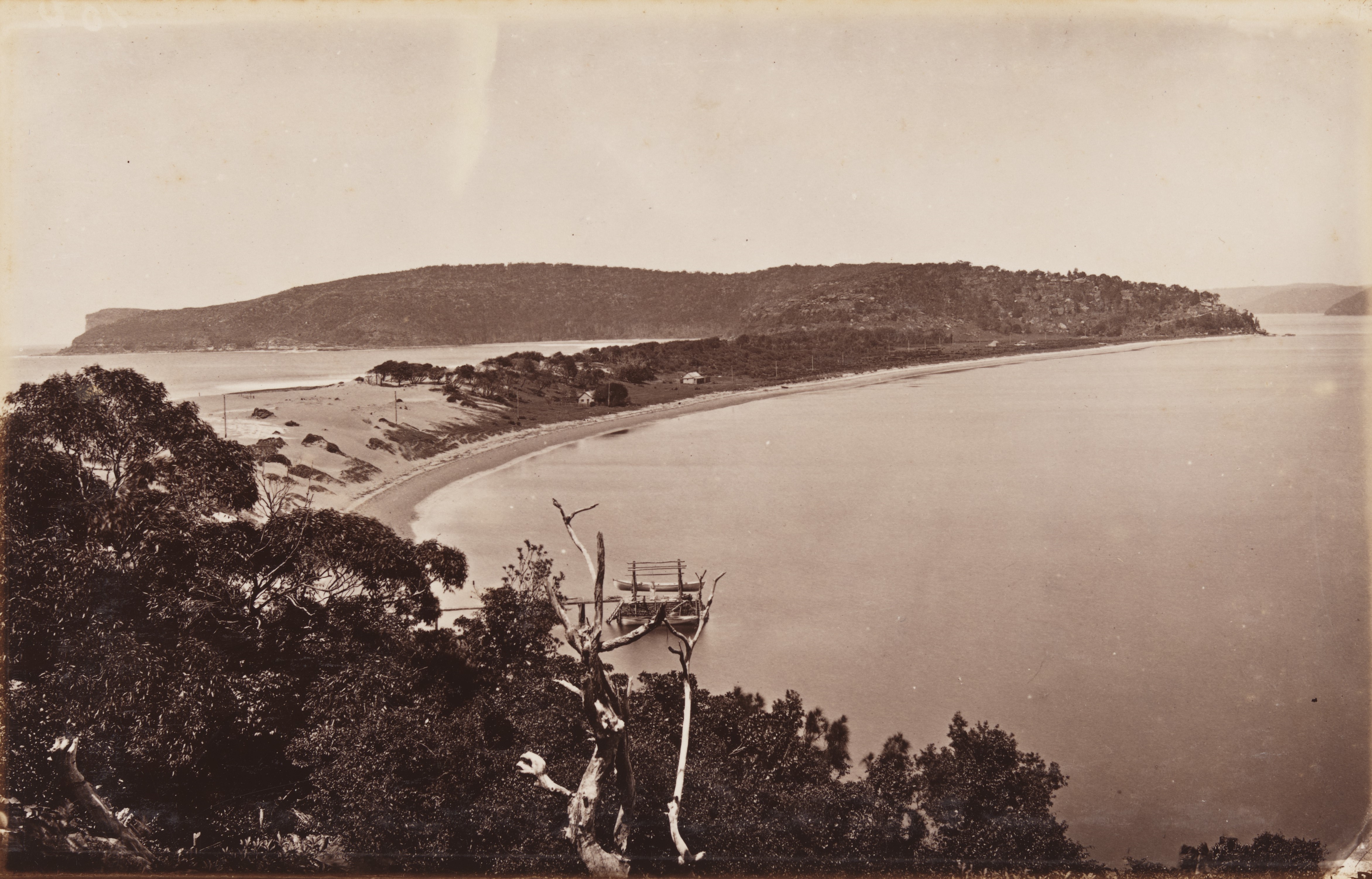
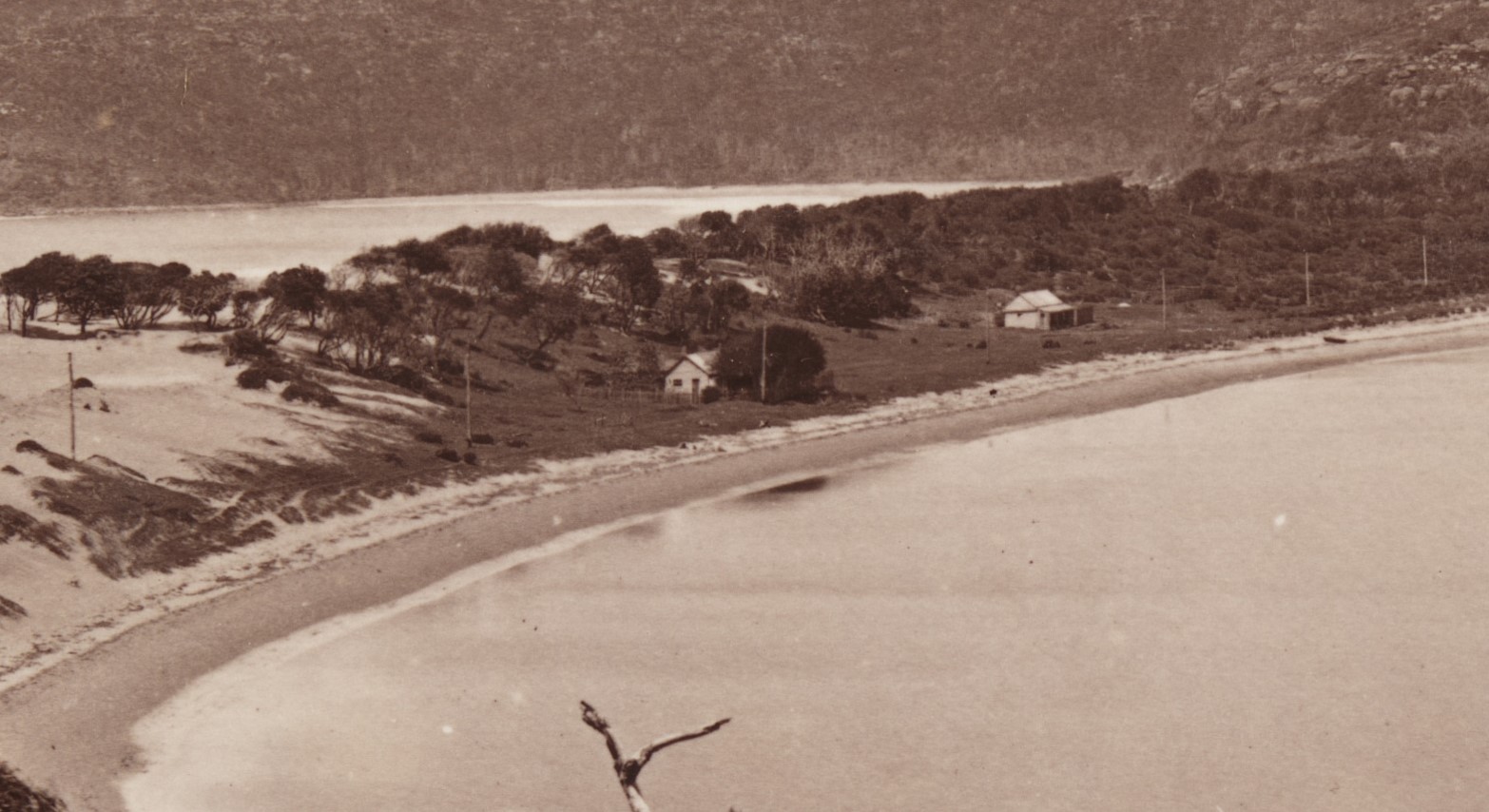
.jpg?timestamp=1707416129938)
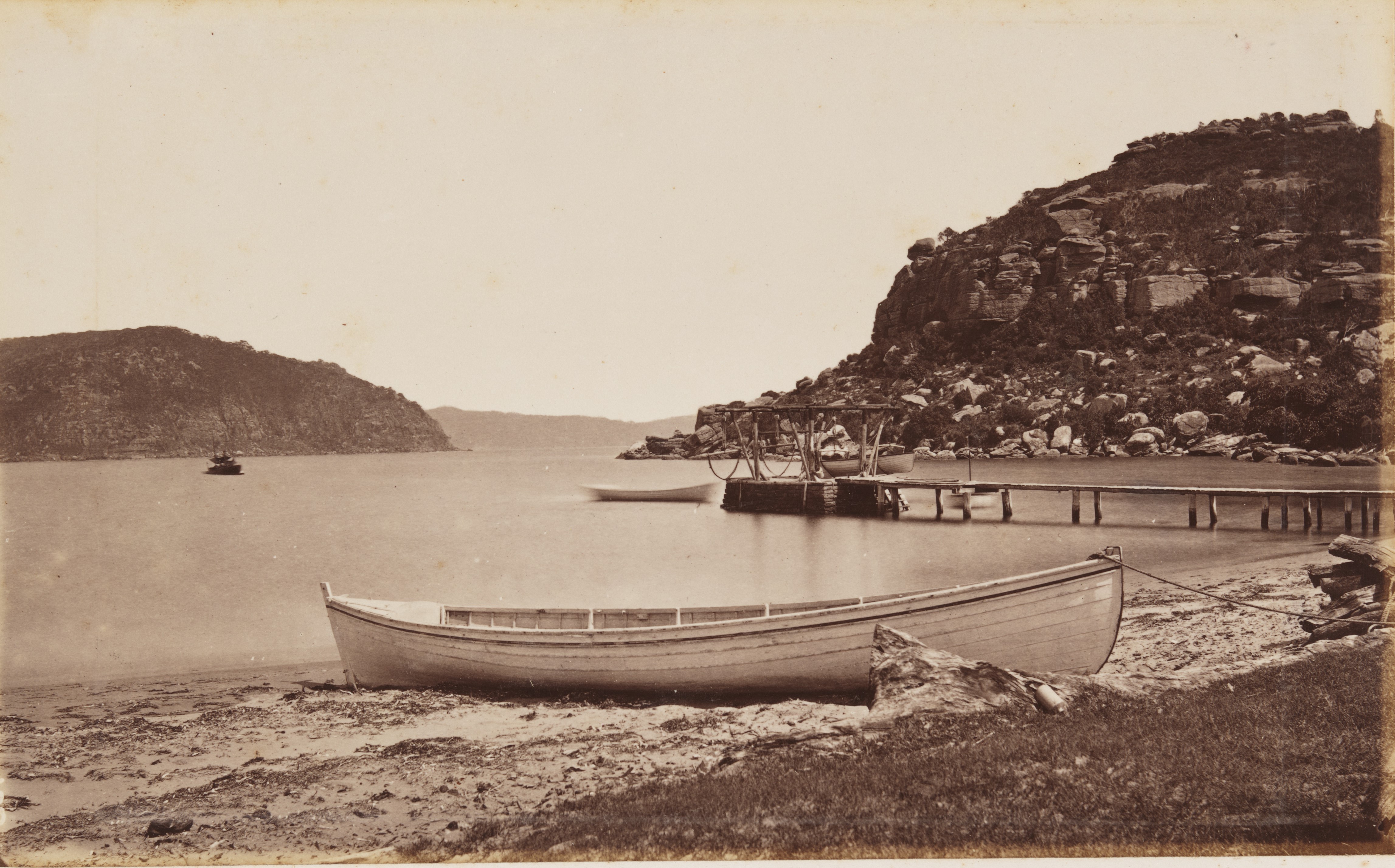
.jpg?timestamp=1707416223245)
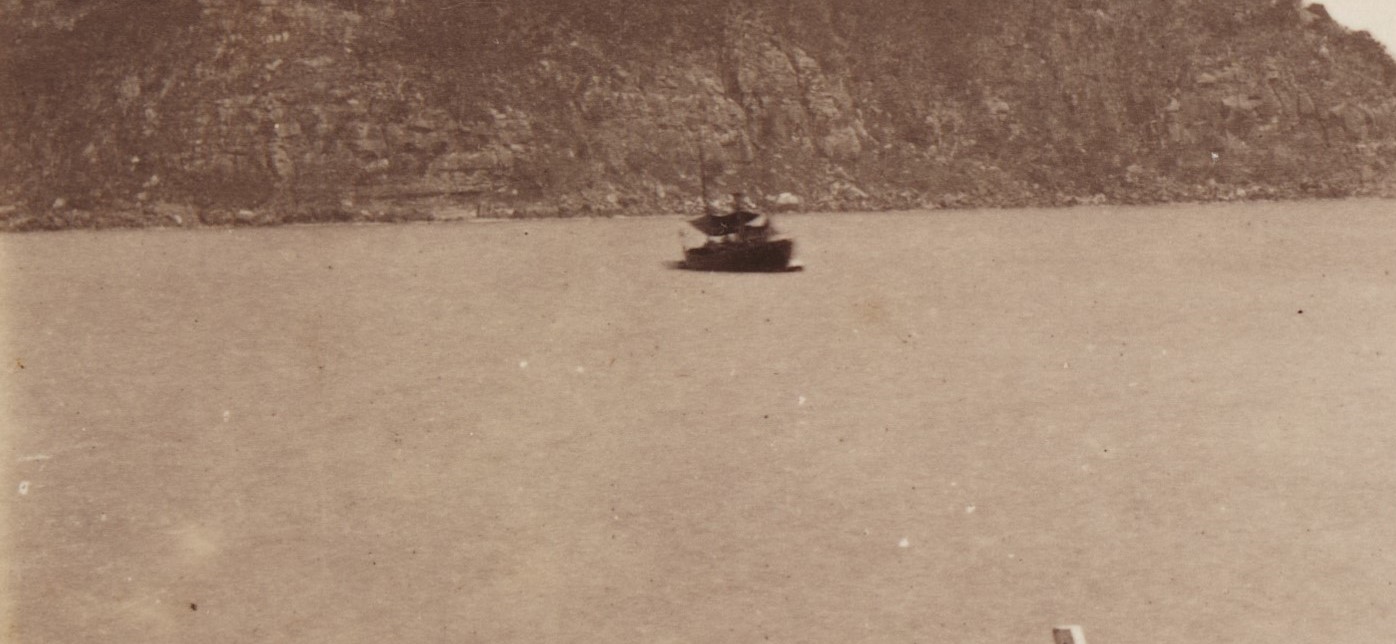
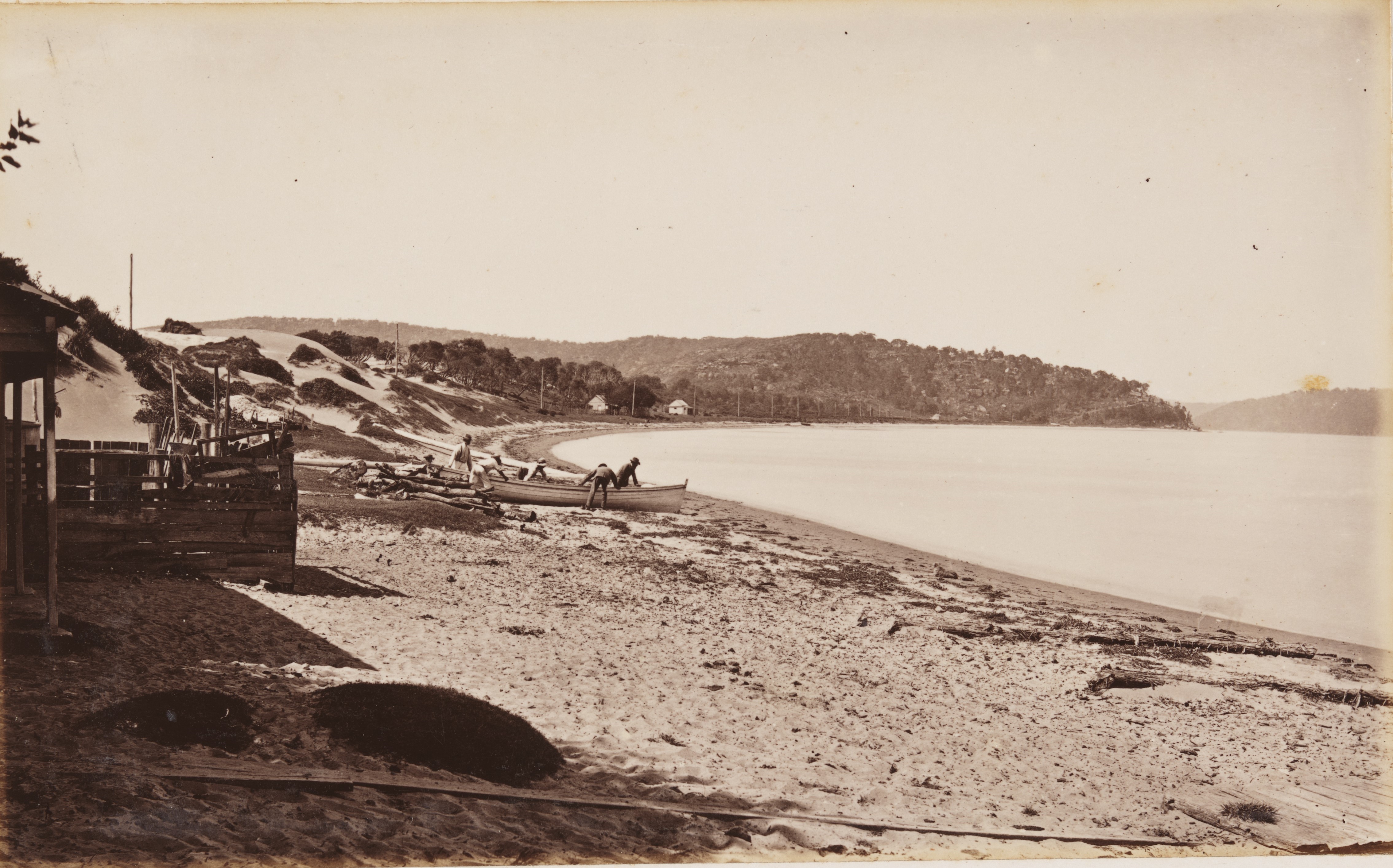
.jpg?timestamp=1707416322130)
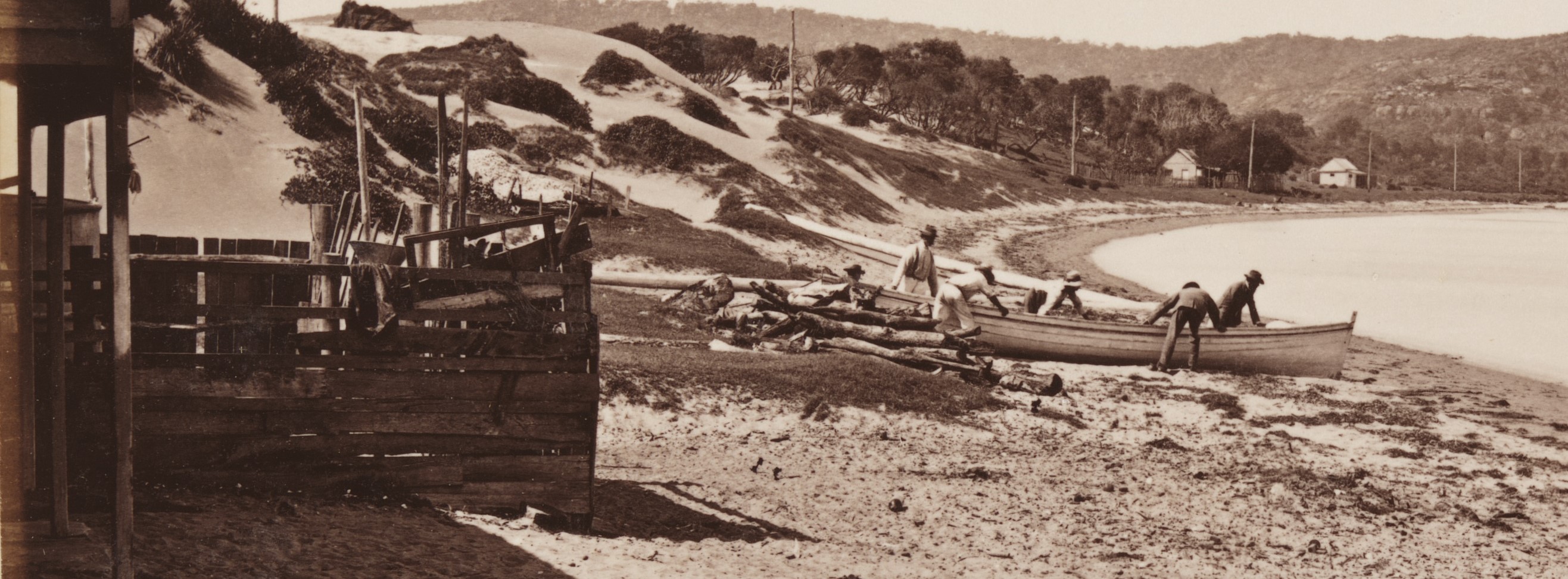
In Smuggling at Broken Bay by Shelagh Champion OAM a notorious instance of smuggling in Pittwater indicates a ‘final straw’ and reason for constructing and maintaining a Customs Station in Broken Bay by 1842. Pittwater, Broken Bay and the many tributaries of the Hawkesbury with all their caves along shorelines and creek beds were obvious places to hide contraband and move it overland into Sydney. The amount of large and small vessels coming and going or mooring in Pittwater’s quieter waters when gales made seas dangerous, and a logged count of these, would have added impetus in checking the destinations and safety of the many ships running up and down the east coast of Australia.
The Pittwater waterways and sheltered coves in the early days of New South Wales settlement by Europeans were considered to be Sydney’s second harbour and a port people at leisure as well as in the business of shipping goods knew well. Relatives of original settlers speak of an attitude of Pittwater being far enough away from Sydney to be free of the scrutiny of Law keepers. With men who also worked their own holdings appointed as constables for the district, Martin Burke and Robert MacIntosh (Pittwater) Robert Henderson (Brisbane Waters), a man who later sold rum, ambiguity around those sent to catch crooks smuggling or residents running illegal stills focused further scrutiny on the district. Interestingly the name of a local cave, the ‘Hole in the Wall’ at Avalon, seems to illustrate a long held local attitude towards the ‘rogue’s game’;
''Hole In the Wall."
When I was in Scotland, I visited many crofter's homes in the Highlands with my uncle, a minister of the Church of Scotland. The typical home of the Scotch peasants consists of a passage and a "But and Ben" on the ground floor, and a loft above the "But" is the living room or kitchen, and the "Ben" is the best room. In both are the concealed beds always known as box-beds. Sliding doors hide the beds during the day. I have seen these beds in a modern flat in Glasgow, and in crofters' homes around Grantown, also at Cromarty, Inverness, Dingwall, Oban, and Helensburgh, but never heard them called "The Hole in the Wall;" they are always termed box-beds. I believe Robbie Burns was born in one, and I think so was Hugh Millar.
Is it not more likely that the old Inn at Paddington called "The Hole in the Wall" derived its name from the old "Hole In the Wall" at Pittwater, near Sydney, which was well known 70 or 80 years ago, or from some similar natural formation in the cliffs found very frequently along the Cornish coast. These were commonly associated with the smuggling of brandy and French wines to escape the duty. Many a boatload of contraband spirits escaped the excise officers by disappearing through one of these, natural arches called "The Hole in the Wall." It seems very possible that some old Sydney Innkeeper associated with smuggling in his early days, or with the providing of duty free spirits, called his inn by this name in the hope of attracting ex-smugglers, seamen, and others who, on principle, preferred spirits that had evaded the duty. I am, etc., MARY E. J. YEO. Yass, Oct. 27. "THE HOLE IN THE WALL.". (1927, October 31). The Sydney Morning Herald (NSW : 1842 - 1954), p. 8. Retrieved from http://nla.gov.au/nla.news-article28054926
More about the 'Hole in the Wall' in St Michael's Cave - North Avalon Headland: Some History
The fictional ‘Three Fifties and a Ten’ by the proprietor of the ‘Hawkesbury Chronicle’ George C Johnson, written under one of his nom de plumes, 'Kooyal', gives a further great recounting of one groups escapades meeting a ship off Barrenjoey and moving contraband up the river. Another letter regarding the then recent offloading of rum and brandy from the Fair Barbadian into Broken Bay ignited the District’s infamy anew and was a clarion call demanding to be answered:
SMUGGLING. To the Editors of the Sydney Herald.
GENTLEMEN,--As the late seizure of spirits made by the Water Police, is now the general topic of conversation, I have no doubt it will arouse the Government from the state of apathy and indolence in which it has been indulging itself for the past two years, and show its members the necessity of taking the most prompt and energetic measures, in order| to put a stop to a practice which threatens materially to diminish the revenue, and cause distress to the fair trader : for there can bono doubt, that although the quantity lately seized is large, yet we are warranted to say that it bears a very small proportion to that already successfully run during the past two years, or since the extra inducement has been held out by the Government in the increase of duties ; an inducement which would have yielded to the smuggler of the above spirits, had he succeeded, a clear profit of upwards of £280 above the amount of duties, hail they been as before, at 10s. 2d. per gallon; with such a fact before our eyes, let us ask the Government what has it done to prevent these nefarious transactions? Has it increased the number of revenue officers? Has it established any outports along the coast? No! Or, in a word, has it taken such measures as the nature of the coast, and the inducement offered to the smuggler, would lead us to expect? We are reluctantly compelled to answer in the negative. But leaving for a short time the above, let us take a slight glance at the manner in which these smuggling transactions are carried on, which is simply as follows : a merchant enters for exportation a certain quantity of spirits, signs the usual bonds, passes the proper entries, which being duly accomplished, a Custom House officer is appointed to see the goods properly shipped, which is accordingly done; thus far everything goes on correctly. After receiving the quantity of spirits and tobacco intended to be run, the vessel clears out for Guam, New Zealand, or some such port, hovers about the coast some time to see if she is observed, runs into Broken Bay, and there discharges her cargo, which is stored in some secluded spot, and brought up to Sydney in small quantities, (according to the demand), by the various coasters in the employ of the agents at those parts; these, upon arrival, land their cargoes without the slightest examination, which are accordingly carted away and deposited in the warehouses, and the smuggling finally and successfully completed.
If the above is a correct statement, of the manner in which smuggling is carried on, surely Government is called upon to use every endeavour, if not entirely to suppress, at least to prevent its being carried on to so alarming an extent in the first place, if instead of allowing the revenue cutter to lie idle in the harbour for weeks together, it was sent to keep a continued and vigilant cruise along and in the inlets of the coast, much good might be effected; again, an, active revenue officer with a boat's crew, might be stationed at Broken Bay, or one of the most convenient spots to overhaul every coaster in and out; and thirdly, one or two officers might be stationed to examine the discharge of the coasters, these, with an active watch by the Water Police stationed at Goat Island and Bradley's Head, and keeping an eye at Johnson's Bay, might tend materially to lessen such practices,-and there is no doubt that the increase of the revenue would fully meet the increasing expense of such appointments, and give satisfaction to all parties opposed to this wholesale system of smuggling. COAST GUARD. SMUGGLING. (1842, June 25). The Sydney Herald (NSW : 1831 - 1842), p. 2. Retrieved from http://nla.gov.au/nla.news-article12875864
Government discussions then took place;
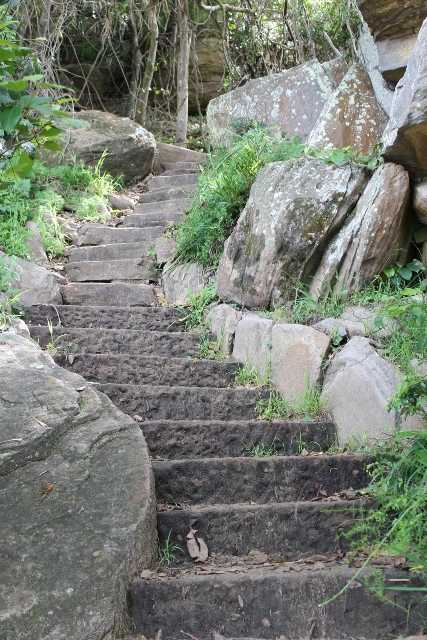 Some conversation took place relative to some additional officers being stationed at Broken Bay, for the prevention of smuggling in that neighbourhood. The Governor said he was aware that it was requisite something should be done in that quarter, but he was not yet prepared with any measure to propose to the council. Legislative Council. (1842, August 11). Australasian Chronicle(Sydney, NSW : 1839 - 1843), p. 2. Retrieved from http://nla.gov.au/nla.news-article31736840
Some conversation took place relative to some additional officers being stationed at Broken Bay, for the prevention of smuggling in that neighbourhood. The Governor said he was aware that it was requisite something should be done in that quarter, but he was not yet prepared with any measure to propose to the council. Legislative Council. (1842, August 11). Australasian Chronicle(Sydney, NSW : 1839 - 1843), p. 2. Retrieved from http://nla.gov.au/nla.news-article31736840
While the trial of those responsible appeared in local newspapers late in 1842, four convicts were sent to build a three roomed timber Customs House and track up to the headland. On 1 November 1st 1842 John Broadley Howard wrote to His Excellency the Governor, soliciting the appointment as Customs Officer. From the Customs House, Sydney, he wrote that;
“I have been upwards of six years a Clerk in this Office, and that previously I had been many years engaged in Maritime pursuits abroad & am well experienced in the management of Boats and affairs of shipping generally.” He was also intimately acquainted with all the vessels belonging to the port at Sydney, and their owners, which he thought would give him an advantage over a stranger in the job. [AO 4/2723] His appointment was recommended by Colonel Gibbes, the Collector of Customs on 23 January 1843. Gibbes described him as being the “third clerk in the Long Room” at the Customs House. Howard was given his orders by Colonel Gibbes on 15 April 1843. [AO 4/5113]
“Three tents will be lent, one for the Officer, one for the Coxswain, and one for the five men until such time as the Huts are erected. The men’s Huts are to [be] built on the Green mound at the foot of the Mountain called Barrenjuee to the Northward and Westward of the Creek and not to extend to the Southward of a supposed line drawn from a large rock on the western Beach, directly East to the Sea. These Huts to be formed of Slabs, with Shingle Roofs - a door - window - and fire place.
The Main Hut to be fourteen feet by ten and the Coxswain’s Hut ten feet by eight exclusive of the fire places. The Officer to place his House on such Spot as he may select - but not more than 400 yards from the men. The first point to be attended to will be to lay down the moorings for the large Boat near the Beach, but where she will not ground at low water and to which she is to be chained and locked. The next to deepen the water hole up the mountain by which a constant supply will be insured. The third to form a winding path up the South face of the Mountain (by clearing the bushes and making steps where required) to a flat space on the top near the western end where a Sentry Box, or watch Hut is to be built, and a flag staff erected. The Commander of the Cutter will point out the several sites. The Coxswain and two hands should be sent to procure slabs, posts, and ground plates and Bark. Two men should first clean the water Hole and afterwards clear the Path. Shingles and battens will most likely be bought cheaper than the men can split them; I should think from 7/- to 10/- the thousand and 3000 will do the two Huts. Stone enough can be procured for rough chimneys and some shells burnt for lime. The Carpenter should put up the bark watch Box and then proceed with the Huts, assisted by the two men who will have finished the Path. When all these matters are finished, all hands can go on with the Officer’s House, store and kitchen.”
The men in the Broken Bay Party were the Coxswain, John Bailey, Ticket of Leave, and five convicts (a carpenter and four boatmen). Howard’s salary was fixed at £175 per annum, with an additional £50 per annum to provide quarters for himself and family, and for the six men. The Government did not provide a house for him, but he regarded his allowance for rent as “handsome”, and thought it fair to put up a respectable cottage. By June the buildings had already cost £85; by August he had laid out above £100 and reckoned on £50 more before he had “made the station look at all comfortable.”
There was another worry: there was no suitable Government land available in the vicinity, and he had to build on private land belonging to the Wentworth family. By March 1844 he was in debt, the buildings having cost more than £200, besides which there was a demand from Captain Towns (the husband of D’Arcy Wentworth’s daughter Sophia) for £25 per annum rent, which Howard, although resisting, appeared to think was his responsibility.
The cottage was built beside where the current Ranger's House is. Directions from Colonel Gibbs of the Customs Service, Sydney, regarding the track were to
"Form a winding path up the south face of the mountain by clearing the bushes and making steps where required, to a flat place on the top near the western end where a sentry box or watch hut is to be built and a flag staff erected."
When the Customs Station was established, ships were required to report before entry into Broken Bay, so a watchman was posted to observe vessels arriving and departing. - "Tales of Barrenjoey" Jervis Sparks, 1992. National Parks and Wildlife Service NSW
This track is what we now know as 'Smugglers Track'; a steep, winding and narrow path. These prerequisites were completed by April 25th 1943 at quite a large sum - but in consequence of the formation of an establishment at Broken Bay, which had been deemed absolutely necessary, in order to prevent the recurrence of frauds on the revenue, which had been perpetrated to an enormous amount, an additional expense of £4386 10s. had been incurred. Legislative Council. (1843, September 30). Australasian Chronicle (Sydney, NSW : 1839 - 1843), p. 2. Retrieved from http://nla.gov.au/nla.news-article31741175
The first Customs Officer of Broken Bay did not have an auspicious beginning;
Providential Deliverance.
On Wednesday last, a boat was picked up in the vicinity of Bird Island by the steamer Thistle, on her passage from Morpeth. She had made signals to the steamer, which was instantly stopped for the purpose of affording succour. The boat was found to belong to the customs, having on board Mr. Howard and a party of three men from the custom's department, who had left Sydney in company with the revenue cutter, which latter was taking down several articles for the formation of the establishment of customs at Broken Bay ; and, upon getting outside the Heads, it commenced blowing very hard from the southwest, when the boats separated, Mr. Howard's boat being drifted off the land, which not withstanding their utmost exertions the men could not gain again, and in all probability never would, as they were twenty-four hours short of provisions, and being somewhat exhausted, they must inevitably have been drifted off to sea and perished, had not the Thistle providentially rescued them from their perilous situation. Captain Mulhall took them onboard the Thistle, and also had the boat hoisted in, and brought them back to Sydney. The other boat, which had also three men on board, has not since been heard of, and fears are entertained for her safety. SYDNEY. (1843, May 20). Launceston Examiner (Tas. : 1842 - 1899), p. 6 Edition: EVENING. Retrieved from http://nla.gov.au/nla.news-article36233574
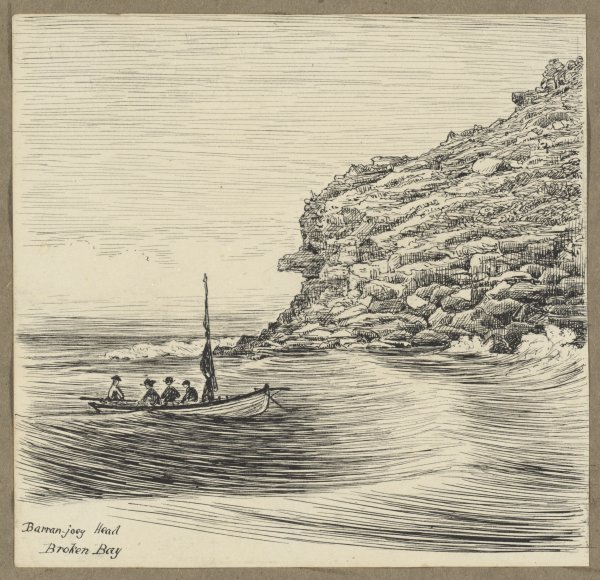
Barranjoey Head, Broken Bay [1884?] nla.pic-an6438965 by Graham, H. J. (Harold John), 1858-1929. Courtesy National Library of Australia
Mr Howard was one of many men who became fathers while stationed at Barrenjoey:
On Wednesday, the 14th instant, at the Customs Station, Broken Bay, Mrs. J. B.Howard, of a daughter. Family Notices. (1845, May 21). The Sydney Morning Herald(NSW : 1842 - 1954), p. 3. Retrieved from http://nla.gov.au/nla.news-article12879665
Apart from keeping an eye on all things shipping Mr Howard was an example of another obvious responsibility these men undertook was to care for those who came within their waters:
Shipwreck. - On Tuesday last, the 22nd instant, about thirty minutes past eight p.m. the cutter Mary Walfe, master, belonging to Mr Parnel, parted her cable whilst laying off Mount Elliott and went ashore. The master and his mate, the only persons on board, managed to save themselves and a portion of the stores. They were taken off the island by Mr Howard, the officer in charge of the customs station at Broken Bay, who lent them a boat, and assistance to proceed to the owner of the vessel, who lives up Burrowra Creek. IMPORTS. (1845, May 3). The Sydney Morning Herald (NSW : 1842 - 1954), p. 2. Retrieved from http://nla.gov.au/nla.news-article12879197
In September 1845 Mr. Howard received a promotion, being appointed Sub Collector of Customs at Portland Bay, Victoria. His place was taken by Richard Williams, who proved to be an efficient Acting Coast Waiter at Broken Bay, in spite of the total loss of sight in one eye.
NEW APPOINTMENT. — His Excellency the Governor haes been pleased to appoint Mr. Richard Williams, of the department of customs at Broken Bay, to be an inspector of distilleries. DR. LEICHARDT. (1846, April 1). Morning Chronicle (Sydney, NSW : 1843 - 1846), p. 2. Retrieved from http://nla.gov.au/nla.news-article31747700
A CONVICT BOATMAN.—On Saturday last, Mr. Richard Williams, Custom-house officer, stationed at Broken Bay, gave Bartholomew Doran, an assigned boatman to the Customs at Broken Bay, in charge to constable McDonald, of the Sydney Police, for robbing the hut of a man named Cornelius Shee. As Shee was absent when the charge was made, and his hut open and emptied of its contents, the value of the property stolen could not be estimated, Doran, on arriving in Sydney, was forwarded to the Hyde Park Barrack Court. Family Notices. (1847, January 27). The Sydney Morning Herald (NSW : 1842 - 1954), p. 2. Retrieved from http://nla.gov.au/nla.news-article12900402
The Customs Officers accepted the help of Bowen Bungaree, who lived with his family at Barrenjoey, in finding illegal stills and venturing out on dark nights to patrol the waters. His duties in successfully stamping out smuggling and illegal stills within the vicinity could also be attributed to a wooden soldier, installed by later Customs Coast Waiter, Mr. Ross;
PITT WATER. EARLY HISTORY. IN THE DAYS OF THE SMUGGLERS.
In a paper on early Pittwater read at the monthly meeting of the Manly Warringah and Pittwater Historical Society Mr W L Ross said that the inlet was an important centre in the early days of the settlement at Sydney Cove. The Hawkesbury and its tributaries produced the bulk of the cereals for the colony and Pittwater was the port for the farming districts. Shipbuilding was also carried on at Pittwater which was considered a wheat growing area. In 1819 a constable Robert McIntosh was sent to the district to preserve law and order
In 1804 said Mr Ross the natives complained to Governor Hunter that the settlers had grown so numerous that the natives had been driven back from the river. The Governor promised that a portion of the district would be reserved for the natives and the remains of their camping places may still be found around the head of Pittwater. For many years a customs-house remained at Barrenjoey and the customs officer had brushes with smugglers. One customs officer fashioned and erected a wooden figure of a soldier near the beach to check the smugglers. The wooden figure was dressed in a pair of white trousers, a scarlet coat and a tall helmet made of tin surmounted with a plume. There was a sword in the hand of the figure and scabbard at Its side. The figure was placed in front of a cave near where the lighthouse now stands. The figure said Mr Ross kept off many smugglers but the captain of one vessel thinking that the drawn sword was a signal of distress, landed to offer assistance and the ruse was exposed. The figure remained until a few years ago when white ants ate the legs and the figure collapsed " Wooden Soldier. (1927, August 2). The Sydney Morning Herald(NSW : 1842 - 1954), p. 10. Retrieved from http://nla.gov.au/nla.news-article16394068
Full history page at link above.